高二上学期第一次月考英语试题 (2)
- 格式:doc
- 大小:63.11 KB
- 文档页数:9
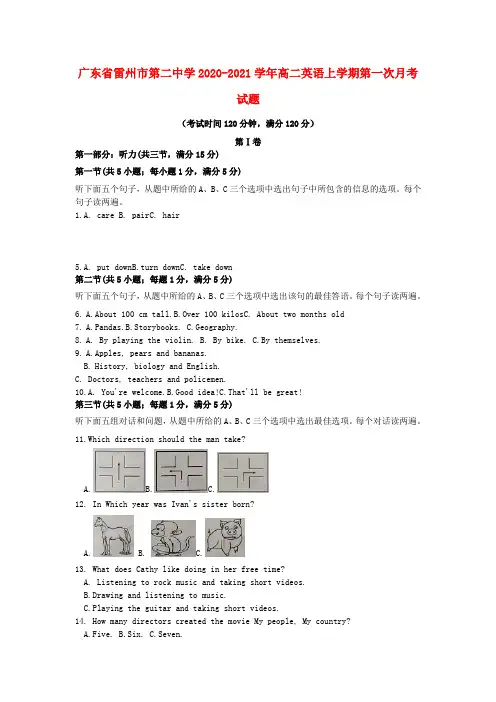
广东省雷州市第二中学2020-2021学年高二英语上学期第一次月考试题(考试时间120分钟,满分120分)第Ⅰ卷第一部分:听力(共三节,满分15分)第一节(共5小题;每小题1分,满分5分)听下面五个句子,从题中所给的A、B、C三个选项中选出句子中所包含的信息的选项。
每个句子读两遍。
1.A. care B. pairC. hair5.A. put downB.turn downC. take down第二节(共5小题;每题1分,满分5分)听下面五个句子,从题中所给的A、B、C三个选项中选出该句的最佳答语。
每个句子读两遍。
6.A.About 100 cm tall.B.Over 100 kilosC. About two months old7.A.Pandas.B.Storybooks. C.Geography.8.A. By playing the violin. B. By bike. C.By themselves.9.A.Apples, pears and bananas.B.History, biology and English.C. Doctors, teachers and policemen.10.A. You're welcome.B.Good idea!C.That'll be great!第三节(共5小题;每题1分,满分5分)听下面五组对话和问题,从题中所给的A、B、C三个选项中选出最佳选项。
每个对话读两遍。
11.Which direction should the man take?A. B. C.12. In Which year was Ivan's sister born?A. B. C.13. What does Cathy like doing in her free time?A. Listening to rock music and taking short videos.B.Drawing and listening to music.C.Playing the guitar and taking short videos.14. How many directors created the movie My people, My country?A.Five.B.Six.C.Seven.15. When will Alice go to see the movie?A. On October 5thB. On October 15thC. On October 25th第二部分完形填空(共15小题;每小题 1 分,满分15分)阅读下面短文,从短文后各题所给的A、B、C和D四个选项中,选出可以填入空白处的最佳选项,并在答题卡上将该项涂黑。
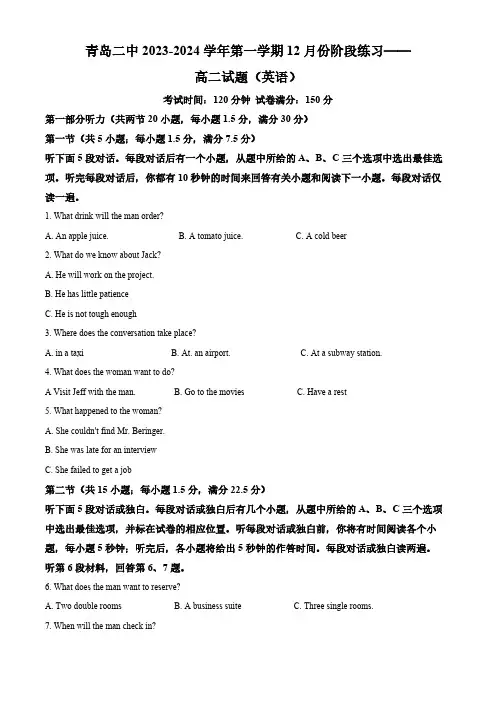
青岛二中2023-2024学年第一学期12月份阶段练习——高二试题(英语)考试时间:120分钟试卷满分:150分第一部分听力(共两节20小题,每小题1.5分,满分30分)第一节(共5小题;每小题1.5分,满分7.5分)听下面5段对话。
每段对话后有一个小题,从题中所给的A、B、C三个选项中选出最佳选项。
听完每段对话后,你都有10秒钟的时间来回答有关小题和阅读下一小题。
每段对话仅读一遍。
1. What drink will the man order?A. An apple juice.B. A tomato juice.C. A cold beer2. What do we know about Jack?A. He will work on the project.B. He has little patienceC. He is not tough enough3. Where does the conversation take place?A. in a taxiB. At. an airport.C. At a subway station.4. What does the woman want to do?A Visit Jeff with the man. B. Go to the movies C. Have a rest5. What happened to the woman?A. She couldn't find Mr. Beringer.B. She was late for an interviewC. She failed to get a job第二节(共15小题;每小题1.5分,满分22.5分)听下面5段对话或独白。
每段对话或独白后有几个小题,从题中所给的A、B、C三个选项中选出最佳选项,并标在试卷的相应位置。
听每段对话或独白前,你将有时间阅读各个小题,每小题5秒钟;听完后,各小题将给出5秒钟的作答时间。
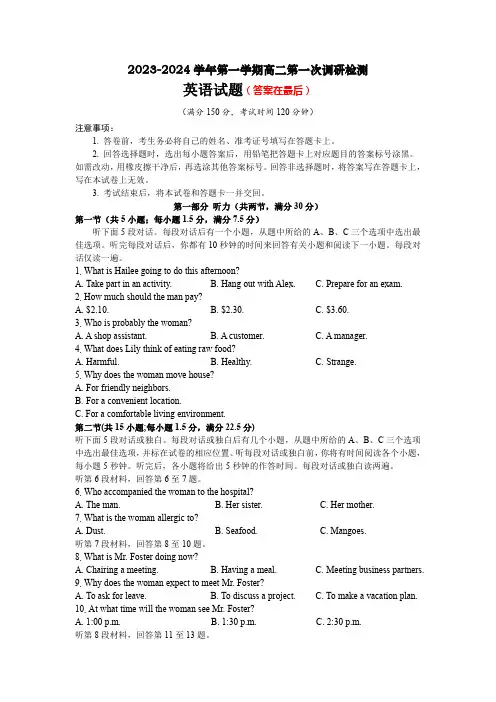
2023-2024学年第一学期高二第一次调研检测英语试题(答案在最后)(满分150分,考试时间120分钟)注意事项:1.答卷前,考生务必将自己的姓名、准考证号填写在答题卡上。
2.回答选择题时,选出每小题答案后,用铅笔把答题卡上对应题目的答案标号涂黑。
如需改动,用橡皮擦干净后,再选涂其他答案标号。
回答非选择题时,将答案写在答题卡上,写在本试卷上无效。
3.考试结束后,将本试卷和答题卡一并交回。
第一部分听力(共两节,满分30分)第一节(共5小题;每小题1.5分,满分7.5分)听下面5段对话。
每段对话后有一个小题,从题中所给的A、B、C三个选项中选出最佳选项。
听完每段对话后,你都有10秒钟的时间来回答有关小题和阅读下一小题。
每段对话仅读一遍。
1.What is Hailee going to do this afternoon?A.Take part in an activity.B.Hang out with Alex.C.Prepare for an exam.2.How much should the man pay?A.$2.10.B.$2.30.C.$3.60.3.Who is probably the woman?A.A shop assistant.B.A customer.C.A manager.4.What does Lily think of eating raw food?A.Harmful.B.Healthy.C.Strange.5.Why does the woman move house?A.For friendly neighbors.B.For a convenient location.C.For a comfortable living environment.第二节(共15小题;每小题1.5分,满分22.5分)听下面5段对话或独白。
每段对话或独白后有几个小题,从题中所给的A、B、C三个选项中选出最佳选项,并标在试卷的相应位置。
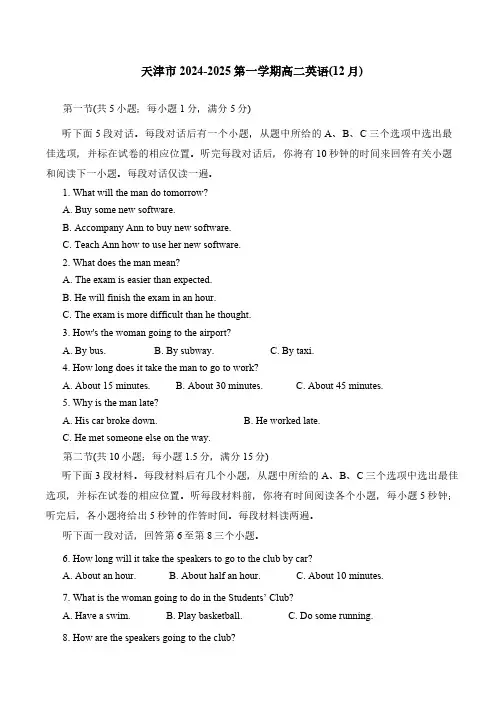
天津市2024-2025第一学期高二英语(12月)第一节(共5小题;每小题1分,满分5分)听下面5段对话。
每段对话后有一个小题,从题中所给的A、B、C三个选项中选出最佳选项,并标在试卷的相应位置。
听完每段对话后,你将有10秒钟的时间来回答有关小题和阅读下一小题。
每段对话仅读一遍。
1. What will the man do tomorrow?A. Buy some new software.B. Accompany Ann to buy new software.C. Teach Ann how to use her new software.2. What does the man mean?A. The exam is easier than expected.B. He will finish the exam in an hour.C. The exam is more difficult than he thought.3. How's the woman going to the airport?A. By bus.B. By subway.C. By taxi.4. How long does it take the man to go to work?A. About 15 minutes.B. About 30 minutes.C. About 45 minutes.5. Why is the man late?A. His car broke down.B. He worked late.C. He met someone else on the way.第二节(共10小题;每小题1.5分,满分15分)听下面3段材料。
每段材料后有几个小题,从题中所给的 A、B、C三个选项中选出最佳选项,并标在试卷的相应位置。
听每段材料前,你将有时间阅读各个小题,每小题5秒钟;听完后,各小题将给出5秒钟的作答时间。
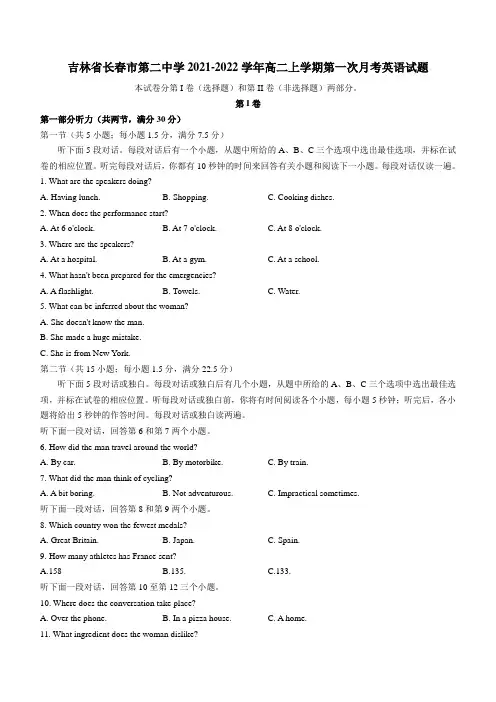
吉林省长春市第二中学2021-2022学年高二上学期第一次月考英语试题本试卷分第I卷(选择题)和第II卷(非选择题)两部分。
第I卷第一部分听力(共两节,满分30分)第一节(共5小题;每小题1.5分,满分7.5分)听下面5段对话。
每段对话后有一个小题,从题中所给的A、B、C三个选项中选出最佳选项,并标在试卷的相应位置。
听完每段对话后,你都有10秒钟的时间来回答有关小题和阅读下一小题。
每段对话仅读一遍。
1. What are the speakers doing?A. Having lunch.B. Shopping.C. Cooking dishes.2. When does the performance start?A. At 6 o'clock.B. At 7 o'clock.C. At 8 o'clock.3. Where are the speakers?A. At a hospital.B. At a gym.C. At a school.4. What hasn't been prepared for the emergencies?A. A flashlight.B. Towels.C. Water.5. What can be inferred about the woman?A. She doesn't know the man.B. She made a huge mistake.C. She is from New York.第二节(共15小题;每小题1.5分,满分22.5分)听下面5段对话或独白。
每段对话或独白后有几个小题,从题中所给的A、B、C三个选项中选出最佳选项,并标在试卷的相应位置。
听每段对话或独白前,你将有时间阅读各个小题,每小题5秒钟;听完后,各小题将给出5秒钟的作答时间。
每段对话或独白读两遍。
听下面一段对话,回答第6和第7两个小题。
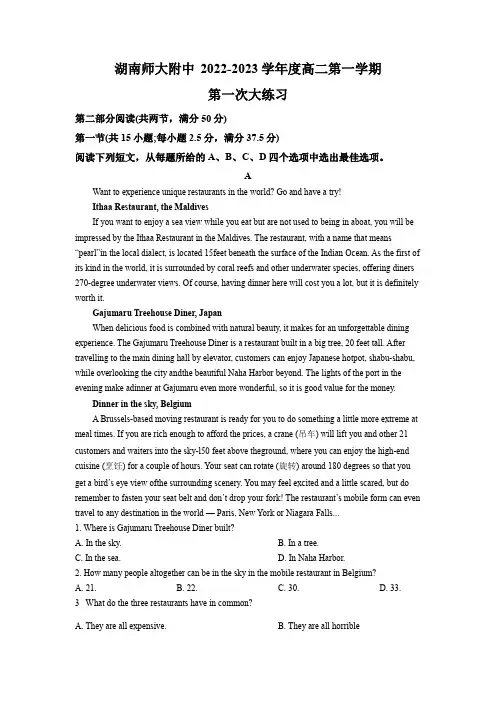
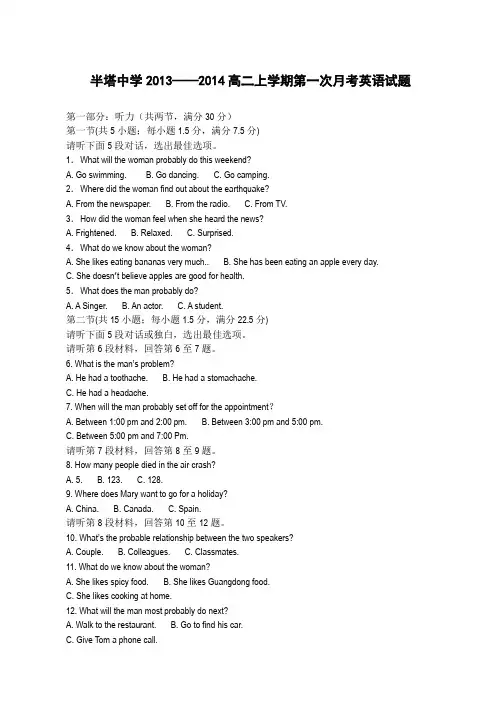
半塔中学2013——2014高二上学期第一次月考英语试题第一部分:听力(共两节,满分30分)第一节(共5小题;每小题1.5分,满分7.5分)请听下面5段对话,选出最佳选项。
1.What will the woman probably do this weekend?A. Go swimming.B. Go dancing.C. Go camping.2.Where did the woman find out about the earthquake?A. From the newspaper.B. From the radio.C. From TV.3.How did the woman feel when she heard the news?A. Frightened.B. Relaxed.C. Surprised.4.What do we know about the woman?A. She likes eating bananas very much..B. She has been eating an apple every day.C. She doesn’t believe apples are good for health.5.What does the man probably do?A. A Singer.B. An actor.C. A student.第二节(共15小题;每小题1.5分,满分22.5分)请听下面5段对话或独白,选出最佳选项。
请听第6段材料,回答第6至7题。
6. What is the man‘s problem?A. He had a toothache.B. He had a stomachache.C. He had a headache.7. When will the man probably set off for the appointment?A. Between 1:00 pm and 2:00 pm.B. Between 3:00 pm and 5:00 pm.C. Between 5:00 pm and 7:00 Pm.请听第7段材料,回答第8至9题。
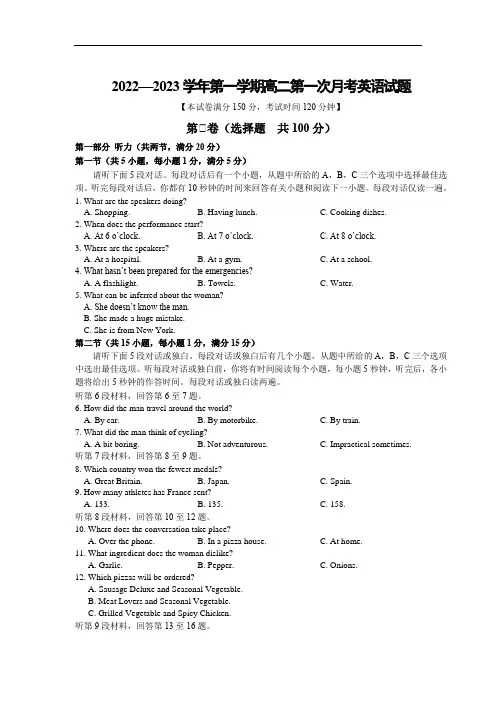
2022—2023学年第一学期高二第一次月考英语试题【本试卷满分150分,考试时间120分钟】第Ⅰ卷(选择题共100分)第一部分听力(共两节,满分20分)第一节(共5小题,每小题1分,满分5分)请听下面5段对话。
每段对话后有一个小题,从题中所给的A,B,C三个选项中选择最佳选项。
听完每段对话后,你都有10秒钟的时间来回答有关小题和阅读下一小题。
每段对话仅读一遍。
1. What are the speakers doing?A. Shopping.B. Having lunch.C. Cooking dishes.2. When does the performance start?A. At 6 o’clock.B. At 7 o’clock.C. At 8 o’clock.3. Where are the speakers?A. At a hospital.B. At a gym.C. At a school.4. What hasn’t been prepared for the emergencies?A. A flashlight.B. Towels.C. Water.5. What can be inferred about the woman?A. She doesn’t know the man.B. She made a huge mistake.C. She is from New York.第二节(共15小题,每小题1分,满分15分)请听下面5段对话或独白。
每段对话或独白后有几个小题,从题中所给的A,B,C三个选项中选出最佳选项。
听每段对话或独白前,你将有时间阅读每个小题,每小题5秒钟,听完后,各小题将给出5秒钟的作答时间。
每段对话或独白读两遍。
听第6段材料,回答第6至7题。
6. How did the man travel around the world?A. By car.B. By motorbike.C. By train.7. What did the man think of cycling?A. A bit boring.B. Not adventurous.C. Impractical sometimes.听第7段材料,回答第8至9题。
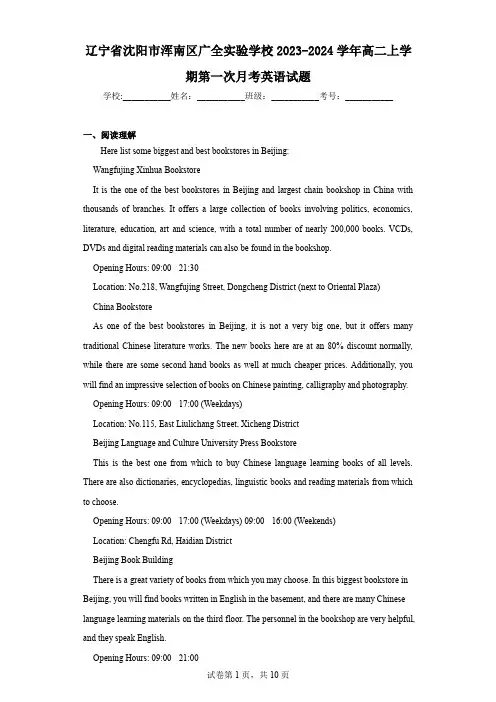
辽宁省沈阳市浑南区广全实验学校2023-2024学年高二上学期第一次月考英语试题学校:___________姓名:___________班级:___________考号:___________一、阅读理解Here list some biggest and best bookstores in Beijing:Wangfujing Xinhua BookstoreIt is the one of the best bookstores in Beijing and largest chain bookshop in China with thousands of branches. It offers a large collection of books involving politics, economics, literature, education, art and science, with a total number of nearly 200,000 books. VCDs, DVDs and digital reading materials can also be found in the bookshop.Opening Hours: 09:00 - 21:30Location: No.218, Wangfujing Street, Dongcheng District (next to Oriental Plaza)China BookstoreAs one of the best bookstores in Beijing, it is not a very big one, but it offers many traditional Chinese literature works. The new books here are at an 80% discount normally, while there are some second hand books as well at much cheaper prices. Additionally, you will find an impressive selection of books on Chinese painting, calligraphy and photography.Opening Hours: 09:00 - 17:00 (Weekdays)Location: No.115, East Liulichang Street, Xicheng DistrictBeijing Language and Culture University Press BookstoreThis is the best one from which to buy Chinese language learning books of all levels. There are also dictionaries, encyclopedias, linguistic books and reading materials from which to choose.Opening Hours: 09:00 - 17:00 (Weekdays) 09:00 - 16:00 (Weekends)Location: Chengfu Rd, Haidian DistrictBeijing Book BuildingThere is a great variety of books from which you may choose. In this biggest bookstore in Beijing, you will find books written in English in the basement, and there are many Chinese language learning materials on the third floor. The personnel in the bookshop are very helpful, and they speak English.Opening Hours: 09:00 - 21:00Location: No.17, West Changan Avenue, Xicheng District1.Which bookstore has the longest opening hours on weekdays?A.China Bookstore.B.Wangfujing Xinhua Bookstore.C.Beijing Language and Culture University Press Bookstore.D.Beijing Book Building.2.Where are you most likely to find affordable new books at a lower price?A.Chengfu Rd, Haidian District.B.No.218, Wangfujing Street, Dongcheng District.C.No.17, West Changan Avenue, Xicheng District.D.No.115, East Liulichang Street, Xicheng District.3.What is special about Beijing Book Building?A.It sells Chinese language learning books.B.It features the largest variety of books.C.It has many floors and sections.D.Its staff can communicate in English.Last month, I began my own two-week-long digital detox. I got the inspiration from the tech writer Paul Miller, who got away from the Internet for a whole year. It was not worth mentioning as against the time Miller spent offline, but it was the longest I had gone through without almost any Internet in 13 years.Why did I do it? For a while I felt the urge to try fully disconnecting to free myself from the endless work. I wanted to take a break from it all for a couple of weeks at least to see what would happen. After all, throughout the last decade, I’ve been online 24 – 7, overreacting to my email inbox and social feed (传送) – living in a world where the line between the digital world and the real world gets a bit unclear at times.I haven’t of course forgotten that I’m CEO of a social media company. My work is built around the premise (前提) that being connected makes our lives richer, more rewarding and more efficient. Still, I’d forgotten one key lesson along the way: moderation. As more and more of my life was spent scanning social feed and checking out my inbox, I realized that I needed to step back and get a whole new perspective.So on my winter vacation to Mexico, I took a break from being active on the Internet forthe entire trip. For the whole 14 days, I ate a lot of delicious fish tacos, surfed and fixed up my cottage on the beach. I didn’t write or send any emails. I didn’t scan any Top 10 lists of feed. The one I did give myself was checking my email inbox occasionally—just to make sure an emergency wasn’t unfolding while I was away.What I learned from my short experiment was actually not too unlike what Miller learned. I didn’t end up discovering that technology is evil. In fact, I found myself reflecting on how technology over the last few years had let me experience some of the most rewarding and eventful moments of my life.4.Why did the author begin digital detox for two weeks?A.Because Miller recommended him to do so.B.Because he was tired of his empty life.C.Because he wanted to live a digital life.D.Because he intended to experience an Internet-free life.5.Which can replace the underlined word in the third paragraph?A.to a large degree B.in an honest wayC.in an appropriate way D.to a very small degree6.Why did the author still check out his email?A.To deal with emergencies.B.For the sake of his health.C.To find some delicious food to eat.D.To watch Top 10 lists closely.7.What can be inferred from the last paragraph?A.The author holds an objective attitude towards technology.B.The author finds technology is harmful.C.The author will advise digital detox completely.D.The author will no longer use the Internet.Sometimes, determining which projects you should devote your time and energy to first takes energy you don’t have to spare (which is why we have tips for how to do it). But even when you know what tasks need to be done, you still need to figure out how to prioritize them. Try the 3-3-3 method.This technique comes from Oliver Burkeman, author of Four Thousand Weeks: Time Management for Mortals($13.99). He advocates planning each workday around a 3-3-3 model, first devoting three hours to deep work on your most important project. Next,complete three other urgent tasks that don’t require three hours of focus. Finally, do three “maintenance” tasks, like cleaning, answering emails, or scheduling other work.What distinguishes this method from other approaches are those first three hours of deep work. Jumping into them first means you’ll be fresh, focused, and more likely to be able to jump into a task without getting distracted. Keep those three hours free of emails, texts, chats, or other menial duties, to the best of your ability. (Check out our full guide to engaging in deep work here.)Deep work produces major productivity, so you’ll get a lot accomplished if you commit to it, but you can’t stay in that mindset (思维模式) forever. You’ll top out after about three hours, so it’s best to have those three other, smaller tasks lined up and ready to go so you can stay productive even while slowing down into less demanding responsibilities.8.What does the 3-3-3 method focus on?A.Urgent tasks.B.Planning and scheduling.C.Spare time.D.The first three hours.9.What does the underlined word “menial” probably mean?A.Unskilled.B.Significant.C.Urgent.D.Necessary. 10.Why should we arrange smaller tasks after deep work?A.Smaller tasks take less time.B.We can’t do two things at once.C.Deep work takes energy.D.Our attention is limited.11.What’s the best title of the passage?A.What is the 3-3-3 method?B.Why the 3-3-3- method worksC.Get More Done With the “3-3-3Method” D.How to Organize Your Life and CareerJapan said Tuesday that it would start pouring treated radioactive water (放射性废水) from the Fukushima nuclear power plant into the Pacific Ocean within two years. Officials in Tokyo said the water would be filtered and diluted (稀释) to safe levels first, but most locals remain firmly opposed to the plan. Protesters gathered outside Prime Minister Yoshihide Suga’s residence in downtown Tokyo to criticize the government’s decision.More than a million tons of radioactive water is currently being stored at the Fukushima power plant in a massive tank farm big enough to fill 500 Olympic-sized swimming pools. The wastewater comes from water pumped in to cool the plant’s damaged reactors (反应堆).The government says it has simply run out of room to store all the water. The plan to dump the water into the ocean first came to light in the autumn of last year, when Japanese news reported anonymous (匿名的) officials said the decision had been taken.On Tuesday, Suga said that after years of study, his scientific advisors had concluded that ocean discharge was the most possible way to cope with the wastewater. But the decision to pour Fukushima wastewater into the ocean has drawn fire from neighboring Asian countries and local fishermen along Japan’s coast.China called the decision “extremely irresponsible,” and South Korea summoned (召唤) the Japanese ambassador in Seoul over the matter. “They told us that they wouldn’t release the water into the sea without the support of fishermen,” Kanji Tachiya, who leads a local cooperative of fisheries in Fukushima, told national broadcaster NHK ahead of the announcement on Tuesday. “We can’t support this move to break that promise and release the water into the sea unilaterally (单方面地).”The actual release of water from the Fukushima plant will take decades to complete. Critics have called on Japan’s government to at least ensure that independent monitoring is in place to check the level of radiation in the poured water is safe for the environment. 12.How do most of the local people react to the plan?A.Indifferent.B.Uncertain.C.Supportive.D.Disapproving. 13.Which of the following is TRUE according to the passage?A.The wastewater is being stored in 500 Olympic-sized swimming pools.B.It was last year that the plan was exposed to the public.C.Ocean discharge is the only way to deal with the wastewater.D.The plan has aroused anger in all the Asian countries.14.What does Kanji Tachiya probably agree with?A.The plan is to pull the whole world into the disaster.B.It’s imperative that the plan should be carried out immediately.C.It’s safe and easy to pour the wastewater into the ocean.D.It’s unacceptable to pour the water into the ocean without fishermen’s permission. 15.What can we infer from the passage?A.The Japanese government has checked the level of radiation in the poured water.B.Neigboring Asian countries agreed the decision to pour Fukushima wastewater into the ocean..C.It will actually take the Fukushima plant long to release treated radioactive water.D.Independent monitoring of the water from the Fukushima plant aren’t necessary.Four habits to live a happier lifeHaving a happier life is something we all always struggle for,and being happy includes so many aspects—mental,physical and spiritual—of our lives.One of the key principles of having a happier life is to always do things that bring us happiness. 16Consider the following habits to improve your life and make it as happy as you possibly can.Praise others.Be kind to others,like praising them. 17 Don't be afraid to tell people how great they look,or how awesome their smile is.It'll do them good,and do you good too!Focus on the present moment.Take some time every day to focus on the present moment. 18 Try not to think about negative past experiences and hug the time you have now.You'll soon find that even the slightest thing that you do at this moment can bring about happiness for many hours and days to come.Learn to control your emotions.19 And it's definitely not worth the emotions.Don't compromise on your happiness just because someone is trying to pick a fight.Just let it go(不要理会)and be happier.20Just before you go to bed,write down at least one wonderful thing that happened.It might be something as small as a child's laugh or something as huge as a million-dollar deal.Whatever it is,be grateful for that day because it will never come again.A.End each day with thankfulness.B.Of course,everyone loves to be happy.C.It is the only certain time we have in our life.D.It can make people happy and give them confidence.E.It's not worth the argument when your partner is testing your patience.F.So it is important to develop the right habits to ensure we live a happier life.G.Try to set aside a few hours a day,doing something fun to make yourself happy.二、完形填空For most people, having things stolen feels like an offence. Robbie Pruitt admitted that he got 21 when he discovered the theft of his mountain bike last September. But soon enough, his 22 took a turn. After letting go of his anger and frustration, he found himself on a road to sympathy 23 .For Pruitt, a keen bicyclist, the first thing to do was 24 his stolen bike. But when he went bike shopping, he found few available, which got him thinking: What if the 25 of bikes was Covid-19 related, and what if the person who’d taken his bike really needed transportation to get to work?With that thought in mind, Pruitt 26 a plan and posted it on the community website. He 27 to fix bikes free of charge for anyone who needed it. He also asked for unwanted bikes, which he would repair again for free. And then he would donate them to folks who could truly use them but didn’t have the 28 to buy one.The day the post went live, Pruitt received thirty 29 bicycles. Then came more than 500 enquiries for detailed information. By the end of 2020, Pruitt had repaired more than 140 for donation or to be 30 to their owners.Pruitt tries to give his donations to families that are 31 struggling. 32 simply satisfying a material need, he has provided an opportunity for kids in his neighborhood to learn how to fix their own bikes.In addition to practical skills, Pruitt’s lessons teach teamwork, encourage self-worth, and promote feelings of community. Meanwhile, the kids have gained a sense of accomplishment.“It’s a really great 33 for kids,“ said a neighbor in an interview with the local newspaper. “Pruitt is certainly providing a 34 , but it’s not just the bikes. It’s the relationships in the community. It’s the 35 that he can make on people.”21.A.shocked B.mad C.curious D.frightened 22.A.emotions B.accesses C.occupations D.routines 23.A.ever B.together C.instead D.yet 24.A.ride B.fit C.repair D.replace 25.A.lack B.variety C.increase D.quality 26.A.came up with B.stuck to C.gave up D.kept away from 27.A.remembered B.refused C.hesitated D.offered28.A.profit B.budget C.courage D.commitment 29.A.shared B.used C.expensive D.modern 30.A.fetched B.sold C.lent D.returned 31.A.hardly B.slightly C.truly D.instantly 32.A.Without B.Beyond C.Upon D.Among 33.A.promise B.celebration C.comfort D.experience 34.A.competition B.service C.ceremony D.suggestion 35.A.influence B.impression C.impact D.progress三、语法填空阅读下面短文,在空白处填入1个适当的单词或括号内单词的正确形式The Hangzhou Asian Games Organizing Committee 36 (announce) on Feb 12 last year that 6G technology would be used in the 19th Asian games in Hangzhou, capital of China’s 37 (east) province of Zhejiang, 38 (aim) to create a high-tech and intelligent sports event.The technology refers 39 reconfigurable intelligent surfaces, 40 AI-empowered artificial material. It is a smart platform enable various 41 (function) such as data mining, communication, energy harvesting, and sensing by directly processing illuminated information-carrying waves at a physical level.“It was 42 (independent) developed by China and boasts low energy consumption 43 high efficiency, 44 can reduce power consumption while increasing the signal transmission efficiency,” said an expert. The technology is still undergoing research and 45 (develop) and is expected to be demonstrated to the public during the Hangzhou Asian Games from Sept 23 to Oct 8.四、书面表达46.《鲁宾逊漂流记》是英国作家丹尼尔·笛福(Daniel Defoe)写的一部著名小说。
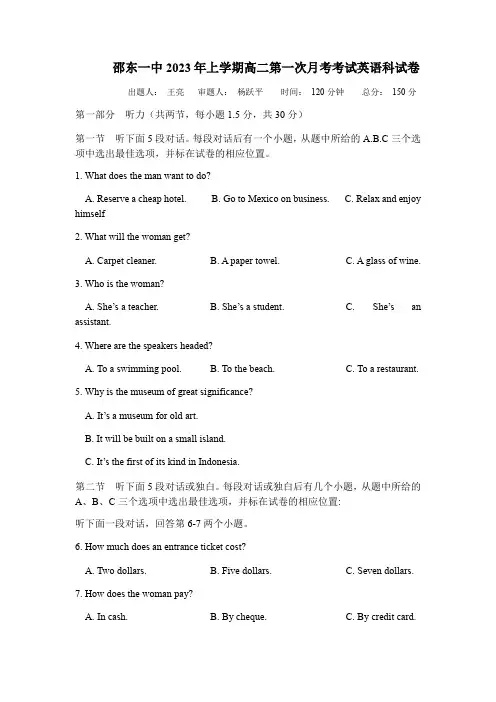
邵东一中2023年上学期高二第一次月考考试英语科试卷出题人:王亮审题人:杨跃平时间:120分钟总分:150分第一部分听力(共两节,每小题1.5分,共30分)第一节听下面5段对话。
每段对话后有一个小题,从题中所给的A.B.C三个选项中选出最佳选项,并标在试卷的相应位置。
1. What does the man want to do?A. Reserve a cheap hotel.B. Go to Mexico on business.C. Relax and enjoy himself2. What will the woman get?A. Carpet cleaner.B. A paper towel.C. A glass of wine.3. Who is the woman?A. She’s a teacher.B. She’s a student.C. She’s an assistant.4. Where are the speakers headed?A. To a swimming pool.B. To the beach.C. To a restaurant.5. Why is the museum of great significance?A. It’s a museum for old art.B. It will be built on a small island.C. It’s the first of its kind in Indonesia.第二节听下面5段对话或独白。
每段对话或独白后有几个小题,从题中所给的A、B、C三个选项中选出最佳选项,并标在试卷的相应位置:听下面一段对话,回答第6-7两个小题。
6. How much does an entrance ticket cost?A. Two dollars.B. Five dollars.C. Seven dollars.7. How does the woman pay?A. In cash.B. By cheque.C. By credit card.听下面一段对话,回答第8-9两个小题。
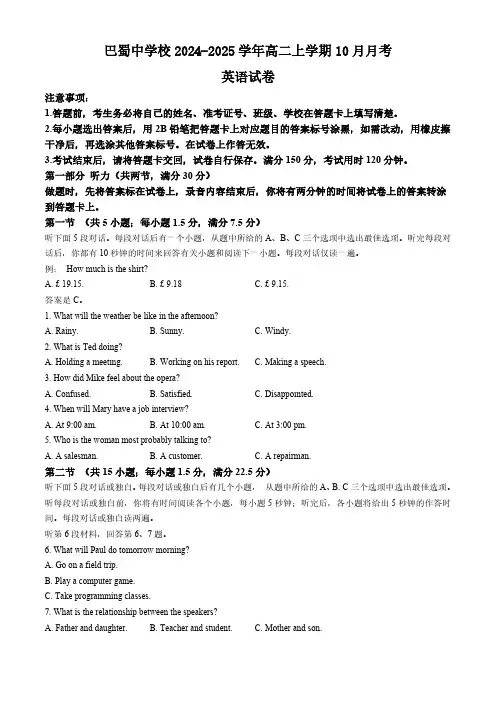
巴蜀中学校2024-2025学年高二上学期10月月考英语试卷注意事项:1.答题前,考生务必将自己的姓名、准考证号、班级、学校在答题卡上填写清楚。
2.每小题选出答案后,用2B铅笔把答题卡上对应题目的答案标号涂黑,如需改动,用橡皮擦干净后,再选涂其他答案标号。
在试卷上作答无效。
3.考试结束后,请将答题卡交回,试卷自行保存。
满分150分,考试用时120分钟。
第一部分听力(共两节,满分30分)做题时,先将答案标在试卷上,录音内容结束后,你将有两分钟的时间将试卷上的答案转涂到答题卡上。
第一节(共5小题;每小题1.5分,满分7.5分)听下面5段对话。
每段对话后有一个小题,从题中所给的A、B、C三个选项中选出最佳选项。
听完每段对话后,你都有10秒钟的时间来回答有关小题和阅读下一小题。
每段对话仅读一遍。
例:How much is the shirt?A. £ 19.15.B. £ 9.18C. £ 9.15.答案是C。
1. What will the weather be like in the afternoon?A. Rainy.B. Sunny.C. Windy.2. What is Ted doing?A. Holding a meetıng.B. Working on his report.C. Making a speech.3. How did Mike feel about the opera?A. Confused.B. Satisfied.C. Disappoınted.4. When will Mary have a job interview?A. At 9:00 am.B. At 10:00 am.C. At 3:00 pm.5. Who is the woman most probably talking to?A. A salesman.B. A customer.C. A repairman.第二节(共15小题;每小题1.5分,满分22.5分)听下面5段对话或独白。
四川省射洪中学2024-2025学年高二(强基班)上学期第一次月考英语试题一、阅读理解Big Thinkers SeriesThe 2022 Big Thinkers Series from New Scientist events features four online talks, covering a wide range of topics by world-class scientist speakers and experts. If you are curious about your planet or your universe, then this series is your place to hear the latest research.Save £20 off the standard ticket price by purchasing a series ticket to all four talks in the Big Thinkers Series (available on-demand) or purchase single tickets for just £13 per lecture (available by early booking).Reality+: From the Matrix to the Metaverse with David ChalmersIn this talk, philosopher David Chalmers argues that Metaverse-style virtual worlds experienced through headsets are also genuine and meaningful realities and we can live a meaningful life in VR.What we don’t know about gravity with Claudia de RhamWe are all familiar with the concept of gravity. In this talk, Professor Claudia de Rham will explore how much we actually know about gravity and how much more there is left to uncover.A Brief History of Timekeeping with Chad OrzelFrom Stonehenge to atomic clocks, here is the 5, 000-year history of how science is used to mark time. Chad Orzel, the internationally bestselling author of How to Teach Quantum Physics to Your Dog, offers us a witty journey through scientific theory and quirky (反常的) historical detail.Physics at the End of the universe with Katie MackThe Big Bang theory tells the story of the beginning of the universe for the last 13. 8 billion years. But how does the story end? Join astronomer Katie Mack as she shares what modern astrophysics tells us about the final fate of the universe.1.How much does a series ticket cost?A.£13.B.£20.C.£30.D.£32.2.What will Chad Orzel lecture in?A.The genuine reality.B.The secrets of gravity.C.The history of time marking.D.The final fate of the universe.3.What do the four talks have in common?A.They are all aimed at science lovers.B.They are all concerned with gravity.C.They will all be given by bestselling authors.D.They will all be given by excellent physicians.“It was written in some sense,” Sophie Blake, a physics professor, would end up in observational cosmology — the study of the origin and development of the universe using specialized telescopes. “I’m not going to lie. My father was a physicist. My mother’s an astronomer. But no kid wants to be like their parents,” she jokes, semi-seriously.Blake always enjoyed building things like a child engineer. It wasn’t unusual for her to experiment with her father’s research equipment. She thanks, in part, her short attention period for her inquisitiveness, “I am always looking for something.”For the last few years, Blake has been searching for signs of the universe’s early existence — from the birth of the first stars to the “cosmic (宇宙的) dark ages” — and she’s building her own equipment to explore beyond the known universe, focusing on its distant past with novel radio technology. Since 2017, Blake and her team have been engineering and planting radio telescopes in two of the Earth’s most remote (and quietest) locations for the best shot at hearing the earliest voice of the universe.Initially, Blake planned a PhD in particle (粒子) physics but switched direction after a visit to a lab with messy equipment and tools everywhere at the California Institute of Technology. “I didn’t know about observational cosmology then but thought, ‘Whatever this is, I want to do that.’”She spent a year at the Amundsen-Scott South Pole Station, after conducting experiments of a balloon-borne microwave telescope launched from McMurdo. “That really inspired my love for remote places,” she said.Eventually, she wanted to engineer her own instruments. After her year at the South Pole, she joined the University of KwaZulu-Natal in South Africa. At that time, the site decision was made for the largest radio telescope group on Earth.“This was also a leap of faith because I really couldn’t continue the work I was doing before.” Blake recalls. “I had never done radio before but I thought, ‘Let me give this a try and see how it goes.’”4.What can we infer from Blake’s joke in paragraph 1?A.She follows in her parents’ footsteps.B.She develops an interest in telescopes.C.She lies about her parents’ professions.D.She lives up to her parents’ expectations. 5.What does the underlined word “inquisitiveness” in paragraph 2 mean?A.Talent.B.Courage.C.Curiosity.D.Intelligence. 6.What stimulated Blake’s passion for distant places?A.Her visit to a lab in a university.B.Her wish to build her own equipment.C.Her faith in hearing the cosmic sound.D.Her experience at a South Pole Station. 7.Which of the following best describes Blake?A.Confident and caring.B.Generous and optimistic.C.Modest and open-minded.D.Adventurous and determined.The male western tanager (唐纳雀) looks like a little flame, while females are less showy, a dusty yellow. In the spring, they prepare to move thousands of miles to the Mountain West of Central America, flying through grasslands, deserts, and occasionally, suburban yards.To fuel them on their lengthy journey, western tanagers fill up on insects and berries. But as global climate change causes spring to start earlier, birds such as western tanagers are arriving at their destination after what’s known as “green-up”, when flowers begin blooming and insects emerge. According to a study published in early March in the journal PNAS, this kind of timing mismatch between migrants (迁移动物) and their food sources, which is happening across North America, could have serious consequences for migratory birds’ survival. “In discussing climate change, we often focus on warming,” says Scott Loss, a co-author of the study. “But the length and timing of seasons — like when winter ends and spring begins — are some of the most dramatic effects of climate change.”Loss and his colleagues used satellite imagery from 2002 to 2021 to calculate the average start of spring green-up along the typical migration routes of 150 North American bird species, then compared that timing with the current green-up. They found that spring is indeed beginningearlier along birds’ migration routes. “By contrary, previous studies have mainly focused on songbirds in Eastern North America,” says Morgan Tingley, an ornithologist at UCLA, “but this new investigation shows that bird species in the West and at different levels of the food web might be just as vulnerable (脆弱的).”“Part of it is knowing which species are vulnerable to various threats,” Loss says. “This adds to the knowledge about vulnerability of a wide range of bird species.” And he hopes that the information will serve to highlight the urgent need to lower greenhouse-gas emissions as fast as possible. “It’s really important, if we can’t address climate change immediately, to try to stop habitat loss as much as we can.”8.What may pose a direct threat to western tanagers’ survival?A.Global warming.B.The duration of changing seasons.C.Loss of habitats due to human activities.D.Decreased access to foods during migration. 9.What is unique about the new study on birds like western tanagers?A.It covers a wider geographic range.B.It reveals the decline in bird populations.C.It centers on the adaptation of bird species.D.It ensures the existence of a timing mismatch.10.What does Loss suggest we do to safeguard migratory birds?A.Lessen the effects of climate change.B.Preserve ecosystems for bird species.C.Address emissions and habitat loss.D.Expand researches on threats to birds. 11.Where is the text most likely from?A.A scientific journal.B.A bird-watching guidebook.C.A website about climate change.D.A magazine about wildlife conservation.Public health data signals a genuine crisis in adolescent mental health: rising rates of anxiety, depression, and hopelessness. But as we worry about teens who are struggling, we can’t ignore another mounting effect — the burdens that are shouldered by their friends and peers in an “always on” world.We have studied teens and tech for over a decade. Their networks are ever-expanding, in no small part because there’s a sense that being nice means accepting fellow requests from acquaintances and friends-of-friends. And it’s not just staying connected — it’s keeping up withwhat others post, too.Social media platforms thus make it technically possible to maintain more relationships than we are historically actually wired to track and manage. The result is an overwhelming wave of social information. It’s especially intense for adolescents whose developmental sensitivities drive them to care deeply about what their peers are doing and thinking.Significant stress comes with trying to be a “good friend” in the age of social media. Friendship requires both public and behind-the-scenes support. Even before a social media post is made public, close friends can be pulled into photo selection, editing, and final examination. Besides, they need to respond in the right way and in the right amount of time, which differs from one relationship to another. Replying too quickly can be seen as over-eager, especially when the friendship is new or not close. But when it’sa close friend, too long a lag (延迟) can be hurtful.The qualities that are key to building or breaking friendships are actually the same as they’ve always been: mutual (相互的) sharing of joys and sorrows, a give and take of acceptance and support, and an ability to weather and resolve conflicts. But technologies have transformed how friendships play out. Social media increases the burdens that come along with being a good friend. Too often, these dynamics hit teens hard in ways that are ignored by adults. And that is what should be changed with the help of parents, schools and other parts of society.12.What makes teenagers' networks continue to expand?A.The pressure to be nice.B.The requests of their parents.C.The need to meet more people.D.The burden of living independently. 13.What does the author think of being a good friend in the age of social media?A.Risk-taking.B.Time-saving.C.Challenging.D.Exciting. 14.What should be changed according to the last paragraph?A.The influences of social media on teen friendship.B.The relations between parents and their teens.C.The conflicts between schools and parents.D.The qualities of being a teen friend.15.What is the text mainly about?A.What makes teens become more sensitive to their peers' needs.B.How social media has made teen friendships more stressful.C.How teens nowadays gain long-standing friendships.D.Why more teens are addicted to social media.Thanks to scientific and technological developments, billions of people today are living a better life than that of kings of centuries ago. 16 After all, despite all the progress we've made, the world faces many challenges in the 21st century: climate change, poverty and cancer, etc.Our best hope of dealing with these challenges is to make science and technology more productive. One practical way to achieve this is through the integration of Artificial Intelligence (AI) and laboratory automation. AI systems already possess superhuman scientific powers. They can remember massive volumes of facts and learn from huge datasets. 17 These powers are highly praised even by human scientists.18 Robots can now carry out most of the laboratory tasks humans can. Then there’re AI Scientists: AI systems integrated with laboratory automations that are capable of carrying out the closed-loop (闭环) automation of scientific research. These systems automatically generate hypotheses (假设) to explain observations, design experiments to test these hypotheses, interpret the results and then repeat the cycle.Within the last year or so, the world has been astonished by the success of Large Language Models (LLMs) like ChatGPT, which have achieved ground-breaking performance on a wide range of conversation- based tasks. 19 This is associated with their capacity to read all the scientific literature and act as a source of scientific knowledge.However, the application of AI to science has the potential for harm. As a step towards preventing this, some scientists have prepared the Stockholm Declaration on AI for Science.20 They urge all scientists working with AI to sign.A.They can carry out perfect logical reasoning.B.Today, laboratory automation is increasingly advancing.C.AI has the potential to transform the very process of thinking.D.These LLMs show great potential for super-charging AI Scientists.E.There’re now about 100 AI Scientists worldwide, working in various areas.F.However, it is deeply surprising how little appreciated this astonishing fact is.G.This commits the signees to the responsible and healthy development of AI for science.二、完形填空When informed that I was to stay in the hospital for a few days for treatment, I never expected it would be such a wonderful experience.A young doctor friend 21 me after his long day, remembering that I had mentioned consistent stomach pain. When he learned I had taken pain killers without being to a 22 , he insisted that my stomach pains be taken seriously. I was 23 to the hospital by him immediately. He accompanied me in the emergency room, and said all the right things to get me through the process 24 . I only got him to 25 me until midnight when my daughters came. I am forever 26 . Two hours later, I was told I was to be 27 .I enjoyed all the unaccustomed 28 . Dear friends came to visit, and all my kids came. Nurses and doctors were particularly attentive, though I would never dream of 29 others. Messages of love and concern filled my phone. Between treatments, I 30 with other patients, and got interviewed by a delightful student nurse, doing a paper. What fun! My story would be included in her 31 !I realized how many people 32 . I am overwhelmed with gratitude for the outpouring of love, the messages and visits and continued support. This experience serves as a 33 , making me aware of the wonderful people whose love gives me 34 and who fill my life with joy. And finally, stay well and please, do not 35 a consistent stomachache!21.A.checked up on B.worked in with C.closed in on D.looked up to 22.A.relative B.nurse C.patient D.doctor 23.A.called B.rushed C.pushed D.moved 24.A.efficiently B.suddenly C.officially D.deliberately 25.A.send B.greet C.admire D.leave 26.A.satisfied B.devoted C.indebted D.amused 27.A.compared B.admitted C.deserted D.cheated 28.A.conclusion B.attention C.excitement D.silence29.A.understanding B.ordering C.bothering D.cheering 30.A.socialized B.agreed C.competed D.reasoned 31.A.acts B.duties C.studies D.tricks 32.A.cared B.suffered C.aged D.matured 33.A.task B.message C.routine D.reminder 34.A.wealth B.value C.strength D.respect 35.A.notice B.overcome C.reserve D.ignore三、语法填空阅读下面短文,在空白处填入1个适当的单词或括号内单词的正确形式。
2022-2021学年高二班级英语第一次月考试题留意事项:1.答题前,先将自己的姓名、准考证号填写在试题卷和答题卡上,并将准考证号条形码粘贴在答题卡上的指定位置。
用2B铅笔将答题卡上试卷类型A后的方框涂黑。
2.选择题的作答:每小题选出答案后,用2B铅笔把答题卡上对应题目的答案标号涂黑,写在试题卷、草稿纸和答题卡上的非答题区域均无效。
3.非选择题的作答:用签字笔直接答在答题卡上对应的答题区域内。
写在试题卷、草稿纸和答题卡上的非答题区域均无效。
4.考试结束后,请将本试题卷和答题卡一并上交。
第一部分阅读理解(共两节,满分60分)第一节(共15小题:每小题3分,满分45分)阅读下列短文,从每题所给的四个选项(A、B、C和D)中选出最佳选项,并在答题卡上将该项涂黑。
AThere are two factors(因素)which determine an individual's intelligence. The first is the sort of brain he is born with. Human brains differ considerably, some being more capable than others. But no matter how good a brain he has to begin with, an individual will have a low order of intelligence unless he has opportunities to learn. So the second factor is what happens to the individual-the sort of environment in which he is brought up. If an individual has less chances environmentally, it is likely that his brain will fail to develop and he will never obtain the level of intelligence of which he is capable.The importance of environment in determining an individual's intelligence can be shown by the case history of the twins. When they were three months old, their parents died, and they were placed in separate homes. Peter was brought up by parents of low intelligence in a separate community with poor educational opportunities. Mark was brought up in the home of well-to-do opportunity to be encouraged intellectually.This environmental difference continued until the twins were in their late teens, when they were given tests to measure their intelligence. Mark's IQ was 125, twenty-five points higher than the average and fully forty points higher than his twin brother. Given equal opportunities, the twins, having similar brains, would have tested at roughly the same level.1. This passage can best be titled______.A. Measuring Your IntelligenceB. Intelligence and EnvironmentC. The Case of Peter and MarkD. How the Brain Influences Intelligence2.The best statement of the main idea of this passage is that______.3.A. human brains differ considerably4.B. the brain a person is born with is important in determining his intelligence5.C. environment is important in determining a person's intelligence6.D. persons having similar brains will have roughly the same intelligence7.According to the passage, the average IQ is______. 8.A. 85 B. 100 C. 110 D. 1254. This passage suggests that an individual's IQ______.A. can be foretold at birthB. stays the same throughout his lifeC. can be increased by educationD. is determined by his childhoodBShort and shy, Ben Saunders was the last kid in his class picked for any sports team. “Football, tennis, cricket—anything with a round ball, I was useless,” he says now with a laugh. But back then he was the object of jokes in school gym classes in England's rural Devonshire.It was a mountain bike he received for his 15th birthday that changed him. At first the teen went biking alone in a nearby forest. Then he began to cycle along with a runner friend. Gradually, Saunders set his mind building up his body, increasing his speed, strength and endurance. At age 18, he ran his first marathon.The following year, he met John Ridgway, who became famous in the 1960s for rowing an open boat across the Atlantic Ocean. Saunders was hired as an instructor at Ridgway's school of Adventure in Scotland, where he learned about the older man's cold-water exploits(成就). Intrigued, Saunders read all he could about Arctic explorers and North Pole expeditions, then decided that this would be his future.Journeys to the Pole aren't the usual holidays for British country boys, and many people dismissed his dream as fantasy. “John Ridgway was one of the few who didn't say, 'You are completely crazy,'” Saunders says.In 2001, after becoming a skilled skier, Saunders started his first long-distance expedition toward the North Pole. He suffered frostbite, had a closer encounter with a polar bear and pushed his body to the limit.Saunders has since become the youngest person to ski alone to the North Pole, and he's skied more of the Arctic by himself than any other Briton. His old playmates would not believe the transformation.This October, Saunders, 27, heads south to explore from the coast of Antarctica to the South Pole and back, an 1800-mile journey that has never been completed on skis.5. The turning point in Saunders' life came when _____A. he started to play ball gamesB. he got a mountain bike at age 15C. he ran his first marathon at age 18D. he started to receive Ridgway's training6. We can learn from the text that Ridgway _______.A. dismissed Saunders' dream as fantasyB. built up his body together with SaundersC. hired Saunders for his cold-water experienceD. won his fame for his voyage across the Atlantic7. What do we know about Saunders?A. He once worked at a school in Scotland.B. He followed Ridgway to explore the North Pole.C. He was chosen for the school sports team as a kid.D. He was the first Briton to ski alone to the North Pole.8. The un derlined word “Intrigued” in the third paragraph probably means_____.A. ExcitedB. ConvincedC. DelightedD. FascinatedCToo much TV-watching can harm children's ability to learn and even reduce their chances of getting a college degree, new studies suggest in the latest effort to examine the effects of television on children.One of the studies looked at nearly 400 northern California third-graders. Those with TVs in their bedroomsscored about eight points lower on math and language arts tests than children without bedroom TVs.A second study, looking at nearly 1,000 grown-ups in New Zealand, found lower education levels among26-year-olds who had watched lots of TV during childhood. But the results don't prove that TV is the cause and don't rule out that already poorly motivated youngsters (年轻人) may watch lots of TV.Their study measured the TV habits of 26-year-olds between ages 5 and 15. Those with college degrees had watched an average of less than two hours of TV per weeknight during childhood, compared with an average of more than 2.5 hours for those who had no education beyond high school.In the California study, children with TVs in their rooms but no computer at home scored the lowest, while those with no bedroom TV but who had home computers scored the highest.While this study does not prove that bedroom TV sets caused the lower scores, it adds to accumulating findings that children shouldn't have TVs in their bedrooms.9. According to the California study, the low-scoring group might____.A. have watched a lot of TVB. not be interested in mathC. be unable to go to collegeD. have had computers in their bedrooms10. What can we learn from the last two paragraphs?A. More time should be spent on computers.B. Children should be forbidden from watching TV.C. TV sets shouldn't be allowed in children's bedrooms.D. Further studies on high-achieving students should be done.11. What would be the best title for this text?A. Computers or TelevisionB. Effects of Television on ChildrenC. Studies on TV and College EducationD. Television and Children's Learning HabitsDThat cold January night, I was growing sick of my life in San Francisco. There I was, walking home at one in the morning after a tiring practice at the theatre. With opening night only a week away, I was still learning my lines. I was having trouble dealing with my part-time job at the bank and my acting at night at the same time. As I walked, I thought seriously about giving up both acting and San Francisco. City life had become too much for me.As I walked down empty streets under tall buildings, I felt very small and cold. I began running, both to keep warm and to keep away from any possible robbers. Very few people were still out except a few sad-looking homeless people under blankets.About a block from my apartment, I heard a sound behind me. I turned quickly, half expecting to see someone with a knife or a gun. The street was empty. All I saw was a shining streetlight. Still, the noise had made me nervous, so I started to run faster. Not until I reached my apartment building and unlocked the door did I realize what the noise had been. It had been my wallet falling to the sidewalk.Suddenly I wasn't cold or tired anymore. I ran out of the door and back to where I'd heard the noise. Although I searched the sidewalk anxiously for fifteen minutes, my wallet was nowhere to be found.Just as I was about to give up the search, I heard the garbage truck pull up to the sidewalk next to me. When a voice called from the inside,“Alisa Camacho?”, I thought I was dreaming. How could this man know my name? The door opened, and out jumped a small red-haired man with an amused look in his eyes.“Is this what you're looking for?”he asked, ho lding up a small square shape.It was nearly 3 a.m. by the time I got into bed. I wouldn't get much sleep that night, but I had gotten my wallet back. I also had gotten back some enjoyment of city life. I realized that the city couldn't be a bad place as long as people were willing to help each other.12. How did the writer feel when she was walking home after work?A. Cold and sick.B. Fortunate and helpful.C. Satisfied and cheerful.D. Disappointed and helpless.13. From the first paragraph, we lean that the writer was busy ______.A. solving her problem at the bankB. taking part in various city activitiesC. learning acting in an evening schoolD. preparing for the first night show14. On her way home the writer______.A. lost her wallet unknowinglyB. was stopped by a garbage truck driverC. was robbed of her wallet by an armed manD. found some homeless people following her15. From the text, we can infer that the writer______.A. would stop working at nightB. would stay on in San FranciscoC. would make friends with cleanersD. would give up her job at the bank其次节 (共5小题,每小题3分,满分15分)依据短文内容,从短文后的选项中选出能填入空白处的最佳选项。
2021年高二上学期第一次月考英语试题word版含答案I. 听力部分:(共两节,满分30分)听下面五段对话,回答第1-5小题:1. What is the woman going to do?A. Make a speech.B. Leave early.C. Join the discussion.2. Which color shirt will the man buy?A. Red.B. White.C. Green.3. What is the probable relationship between the speakers?A. Neighbors.B. Strangers.C. Co-workers.4. What do you know about the man?A. He’s been to the hotel before.B. He’s worried about the food.C. He’s going to Mexico.5. What will the woman probably do for the man?A. Cook the dishes.B. Carry the boxes.C. Clean the house.听下面一段对话,回答第6和第7题。
6. What does Harris probably want to do with Olivia?A. Have lunch.B. Watch a movie.C. Go to her office.7. When will Harris and Olivia meet?A. At 6:50.B. At 10:00.C. At 7:10.听下面一段对话,回答第8至第10题。
8. What does the woman like about the armchair?A. Its design.B. Its color.C. Its size.9. What do we know about the sp eakers’ armchair at home?A. It is badly broken.B. It is heavy looking.C. It is brown in color.10. What will the speakers probably do about the armchair?A. Buy it right away.B. Wait for a sale.C. Ask for a cheaper price.听下面一段对话,回答第11和第12题。
高二年级上学期第一次月考英语试卷命题人:朱守亮审题人:周冰晶时间:120分钟总分:120分第一部分听力(共两节,满分10分)第一节(共5小题;每小题0.5分,满分2.5分)听下面5段对话。
每段对话后有一个小题,从题中所给的A、B、C三个选项中选出最佳选项,并标在试卷的相应位置。
听完每段对话后,你都有10秒钟的时间来回答有关小题和阅读下一小题。
每段对话仅读一遍。
1. Where is the man’s wallet?A. On the sofaB. On the tableC. By the light2. What does the man want to do today?A. Go to a shopB. Attend a birthday partyC. Watch a football match3. What does the man like doing?A. StudyingB. Watching concertsC. Reading newspapers4. What does the woman think of Tom’s being captain?A. BadB. UnfairC. Reasonable5. Where does this conversation take place?A. In a caféB. In a marketC. In a street第二节(共15小题;每小题0.5分,满分7.5分)听下面5段对话或独白。
每段对话或独白后有几个小题,从题中所给的A、B、C三个选项中选出最佳选项,并标在试卷的相应位置。
听每段对话或独白前,你将有时间阅读各个小题,每小题5秒钟;听完后,各小题将给出5秒钟的作答时间。
每段对话或独白读两遍。
听第6段材料,回答第6、7题。
6. Why didn’t the man take the woman to see the film?A. He didn’t think the film was suitable for her.B. He was not sure whether the film is good or not.C. He thought she was unwilling to go with him.7. What does the man think of the film?A. It is enjoyable.B. It is funny.C. It is boring.听第7段材料,回答第8、9题。
高二英语本试题分第Ⅰ卷(选择题)和第Ⅱ卷(非选择题)两部分。
考试结束后,只交答题纸和答题卡,试题自己保留。
本试卷共150分,时间为120分钟。
第I卷第一部分:听力(共两节,满分30分)第一节(共5小题,每小题1.5分,满分7.5分)听下面5段对话。
每段对话后有一个小题,从题中所给的A,B,C三个选项中选出最佳选项,并标在试卷的相应位置。
听完每段对话后,你都有10秒钟的时间来回答有关小题和阅读下一小题。
每段对话仅读一遍.例:How much is the shirt?A. $19.15.B. $9.15.C. $9.18.答案是B。
1.How will the man go to the park?A.By busB.By bikeC.On foot2.What is the picture of?A.A cityB. A farmC. A pet.3. What is the woman doing now?A. Having a meetingB. Having a mealC. working4. Which city did the man visit before?A. ShanghaiB. Beijing .C. Hangzhou5.What does the woman think of the new film star?A.He is popular with young people.B.He isn’t a good actor.C.He is handsome.第二节(共15小题,每小题1.5分,满分22.5分)听下面5段对话或独白。
每段对话或独白后有几个小题,从题中所给的A,B,C三个选项中选出最佳选项,并标在试卷的相应位置。
听每段对话或独白前,你将有时间阅读各个小题,每小题5秒钟;听完后,各小题将给出5秒钟的作答时间。
每段对话或独白读两遍。
听第6段材料,回答第6至7题。
6. Who is Suzie?A. Tom’s secretaryB. Mr.Walker’s secretaryC. Mr.Walker’s wife.7.Why does the woman feel upset?A. She feels uselessB.She is late for work.C.Tom is angry with her.听第7段材料,回答第8至10题。
8.What is wrong with the woman?A. Her back hurtsB. Her head aches.C. Her hand is painful.9.What day is today?A. TuesdayB. WednesdayC. Thursday10.What will the woman do next?A. Take an examinationB. Take her blood pressureC. Get some medicine.听第8段材料,回答第11至13题。
11.When did the speakers plan to travel to Michigan?A. TomorrowB. Next weekC. Early next month12.Why does the man call the woman?A.To cancel the trip.B.To change the time of the tripC.To ask about the opinions of Jack and Jane.13.What will the man do?A.Deal with his family emergency.B.Get the air tickets.C.Call Jack and Jane听第9段材料,回答第14至16题14.What did the teachers do after Tim got into trouble?A. They always punished him.B. They talked to his parentsC.They often laughed at him.15. Why did Tim lie down with his bike on top of him?A. To get away from school.B. To make his mother angryC.To play a joke on his mother.16.What do we know about Tim?A. He used to sit on his own at school.B.He was often absent from school.C.He often played jokes on his teachers.听第10段材料,回答第17至20题17.Where are the two rooms located?A.On the second floor.B. On the fourth floorC. On the fifth floor.18.How much will Peter pay for one room each night?A.$200B.$400C.$600.19.What kind of payment is NOT accepted?A.CashB.Credit cardC.Check20.When will Peter arrive at the hotel?A.August 10B.August 12.C.August 20第二部分:英语知识运用(共两节, 满分45分)第一节:单项填空(共15小题,每小题1分,满分15分)从A、B、C、D四个选项中,选出可以填入空白处的最佳选项,并在答题卡上将该项涂黑。
21.Hemlock is one of nature’s oldest and most___poisons.A.deathB.dyingC.deadD.deadly22. I don’t think his reason for being late makes_____.eB.senseC.valueD.cause23. ___the ending,it’s a really good film.A.Rather thanB.BesidesC.Apart fromD.But24. Eating too much fat can___heart disease and cause high blood pressure.A.devote toB.attend toC.dedicate toD.contribute to25. I’m sorry,those overcoats are not_____in your color and size.A.valuableB.capableC.availablefortable26. They discussed the problem several times,but could come to no____.A.resultB.endC.conclusionD.judgment.27. Children must be instructed___road safety before they are allowed to ride a bike on the road.A.inB.ofC.withD.by28. Japanese is less difficult____than Chinese.A.to be learnedB.learningC.learnedD.to learn29. The government leaders will hold a meeting to discuss the proposal___by the workers.A.put awayB.put forwardC.put upD.put out30. If it is quite____to you,I will visit you next Tuesday.A.fairB.convenientC.easyfortable31. ___,they went home.A.They finished their workB.Work doneC.Work to be doneD.Work having done32. The question___now at the meeting is not the question____yesterday.A.discussing,discussingB.discussed,discussedC.being discussed,discussedD.discussing,having dicussed33. ___many times,but he still couldn’t understand it.A.Having been toldB.Although he had been toldC.He had been toldD.I having told34.Once lost, .A.it is hard to get such a chance againB.one can never get such a chance againC.to get such a chance is difficultD.such a chance might never come again.35. Traveling abroad exposes children___different languages and cultures.A.withB.toC.ofD.into第二节完型填空(共20小题;每小题1.5 分,满分30 分)阅读下面短文,掌握其大意,然后从36-55各题所给的四个选项(A、B、C和D)中,选出最佳选项,并在答题卡上将该项涂黑。
Last Sunday, in my return from a weekend in the country, I took a taxi from Waterloo Station to my home in North London. We hadn’t gone very f ar 36 we had to stop at one of the many traffic lights. Just as the light was changing to 37 a policeman pulled 38 the door of the taxi, jumped in, shouted to the driver,“39 that blue car in front. It’s been stolen,”and he sat down on the seat beside me. Then he seemed to see me for the first time for he said quickly but 40 ,“Sorry sir, but I’ve got to catch that car.”The taxi driver41 the speed without saying anything. After a few hundred yards the blue car stopped at 42 traffic light and we drew up 43 .The policeman got out, ran round to the driver’s door of the blue car, opened it and 44 the driver out. I couldn’t hear what was said, but after a few minutes the policeman45 to me and I went up to him. He asked me to help him take the car thief to the nearest 46 .The three of us got into the 47 .We drove off 48 the taxi following. I didn’t like sitting next to the 49 ,who was a young, rather tough-looking man, but I had no 50 . 51 it wasn’t far to the police-station. When we got there the policeman took my name and address, thanked me for my 52 and said I could go. So I got back into my taxi and we drove off again. The taxi-driver said 53 that that was the second time in a month he had been 54 to he1p the police, and he 55 it wouldn’t happen again.36.A.until B.because C.after D.before 37.A.orange B.yellow C.green D. red38.A.out B.up C.open D.aside 39.A.Follow B.Catch C.Knock D.Watch 40.A.politely B.apologically C.gently D.clearly 41.A.increased B.kept C.slowed D.removed42.A.a B.the C.another D.the other 43.A.off B.beside C.alongside D.away 44.A.brought B.tried C.pulled D.spat 45.A.smiled B.came C.referred D.signed46.A.car-park B.police-station C.traffic-light D.railway-station 47.A.blue taxi B.stolen car C.passing car D.first taxi 48.A.with B.by C.of D.in49.A.thief B.driver C.policeman D.man50.A.luck B.choice C.reason D.way 51.A.Finally B.Naturally C.Fortunately D.Unfortunately 52.A.deed B.action C.help D.words 53.A.happily B.angrily C.curiously D.proudly 54.A.obliged B.seen C.begged D.allowed 55.A.thought B.guessed C.believed D.hoped第三部分: 阅读理解(共20小题;每小题2分,满分40分)阅读下列短文,从每题所给的四个选项(A、B、C和D)中,选出最佳选项,并在答题卡上将该项涂黑。